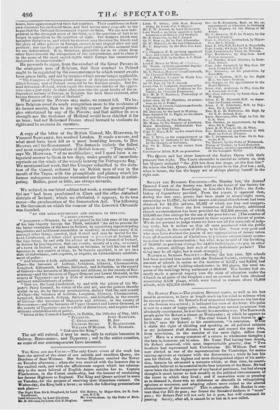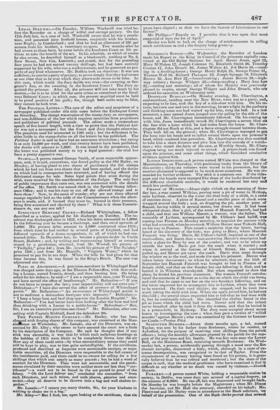Sus Ronewr Peet.—The prudent Baronet seems, as well as his
less notable associate's, to have at length made up his mind to tolerate what he cannot prevent. Sir Robert's fit of unnatural violence on the last day of the Session was critical ; it indicated the turn ef the fever. His pulse is now in a state of happy cairn; and, though we cannot pronounce hint absolutely convalescent, he is evidently in a mending way. The Tamworth people gave Sir Robert a dinner on Wednesday ; at which he appears to have come out very freely. "The chief lesson I have learnt in alb. lie life," says Sir Robert to his constituents, "is toleration. Wbile 1 claim the right of thinking and speaking on all political subjects as my judgment shall dictate, I honour and respect the man who, from conviction, in the exercise of the same right, differs from me." Here is a strong symptom of a return to wholesome thoughts ;- the best is, however, yet to come. Mr. Yates Peel having been drunk, Sir Robert observed, with most imperturbable gravity, that "Two brothers- had represented both Univeristies. Mr. William Peel was now elected as one of the representatives for Cambridge, for main. Mining opinions at variance with the Government ; while he lost his- seat for Oxford, the highest and most distinguished object of his ambi- tion, because he advocated a measure which, at that time, he consci- entiously believed to be essential to the best interests of the State. He had never been the decided supporter of any band of partisans, but had always thought it much better to look steadily at the political circumstances of the times in which they lived ; and if necessities were so pressing as to demand it, there was no dishonour or discredit in relinquishing opinions or measures, and adopting others more suited to the altered. circumstances of the country." This is admirable. Mr. Bankes is con- tent that the Bill do pass ; our friend the Standard declares it "must" pass ; Sir Robert Peel will not only let it pass, but will commend its passing. Surely, after all, it cannot be so bad as it was called. LEGAL Dir..Emsta.—On ruesday, William Wackerill was tried be- fore the Recorder on a charge of wilful and corrupt perjury. On the 17th July last, in a case of bail, Wackerill swore that he was a gentle- man, and possessed nine freehold houses, conjointly with his brother, near Bugby, in Cumberland ; and that he had an allowance of 23/. per annum from his brother, a veterinary surgeon. Two months after he had sworn to these facts, he came before the Insolvent Court on his pe- tition to take the benefit of the act. In his schedule, to which of course he also swore, he described himself as a blacksmith, residing at No. 2, New Street, New Cut, Lambeth ; and stated, that for the preceding four years he had not earned twenty shillings, but had been entirely -supported by his wife, who was a washerwoman, and he possessed no pro- perty of any kind whatsoever. Mr. Bodkin took an objection : It was not sufficient, to convict aparty of perjury, to prove simply that they had sworn at one time that to be true which they afterwards swore to be false. In this case, which would the Jury decide was true—the swearing at Ser- geant's Inn, or the swearing in the Insolvent Court ? The Jury ac- quitted the prisoner. After all, the prisoner will not take much by his motion,—he is to be tried for the-same crime as committed at the Insol- vent Debtors' Court ; in which case, the present acquittal must be held to be proof positive of his guilt; for, though both oaths may be false, they cannot be both true.
TnEs POLITICAL LETTER.—The case of the editor and proprietor of a newspaper published under this title came before the Exchequer Court on Saturday. The charge was evasion of the stamp-duty on newspapers, and non-fulfilment of the law which requires securities from proprietors and publishers of political journals. The editor made a tremendous speech of five hours' length, with a view to prove that the Political Let- ter was not a newspaper ; but the Court and Jury thought otherwise. The penalties sued for amounted to 1201. only; but the defendant is be- sides liable in the stamp-duties on all the letters he has published. The Political Letter is said to have had an enormous circulation ; but rating it at only 12,000 per week, and that twenty letters have been published, the duties will amount to 3,200/. It was stated in the prospectus that the letter was published merely to try a legal question : the trial has been a pretty expensive one.
STAMPS.—A person named George Smith, of most respectable appear- ance, and, it is said, connexions, was found guilty at the Old Bailey, on Monday, of having glued to two sheets of parchment the 25/. stamps which he had cut from two sheets that had been spoiled, and the duties on which had in consequence been returned, and of having offered the fabricated stamps for sale. Some legal points that arose during the trial, were reserved for the consideration of the Judges. The only fact of public importance that came out, was one connected with the details of-the office. Mr. Smith was second clerk in the Spoiled Stamp Allow- ance Office ; and it was his duty to cut off the allowed stamps and to burn them ! Now, in the name of wonder, why are not these allowed stamps regularly laid on the table of the Commissioners when the allow, ance is made, and, if burned they must be, burned in their presence, being first examined and checked by them ? What is it these Commis- sioners do, can any one tell ?
INSOLVENT DEBTORS' CounT.—Richard Whittingham, a fellow described as a waiter, applied for his discharge on Tuesday. The in- solvent was discharged once in 1821, when his debts amounted to 1,000/. In the following year he became a bankrupt, and then owed upwards of 1,000/. His present debts amount to 4,500/. contracted since 1824; from which time he had resided in several parts of England, and had followed upwards of a dozen occupations, in all of which he had con- tracted debts. In December last, he became a picture-dealer in Castle Street, Holbdrn ; and, by writing and representing himself as commis- sioned by a gentleman' obtained, from Mr. Westall, his picture of "Twilight," price 541.; from Mr. Arnold his picture of" The Naiades," price 180!.; and from Mr. Daniells, " Virginia Water," which he promised to pay for in ten days. When the bills he had given for that time became due, be was found in the King's Bench. The case was adjourned sine die.
PLEAS IN ABATEMENT.—A provision.merchant in 'Whitechapel Road was charged some days ago, at the Thames Police-office, with first mak- ing a Lascar, named Ivamin, drunk, and then beating him. On being asked for his defence, he said—" I am a respectable man, your Worship, and have served the office of headborough." Mr. Ballantine—" If you do not learn to respect the laws' your respectability will not serve you." Defendant—" I have also served the office of overseer of Whitechapel parish." Mr. Ballantine." An ex-overseer of NVIiitechapel parish is not to maltreat a defenceless foreigner with impunity." Defendant- " I keep a large ham and beef shop opposite the London Hospital." Mr. Ballantine—" You had better have been looking after the ham and beef than drinking with a Lascar in a public-house." Defendant—" But, Sir, I am an extensive provision-merchant." Mr. Ballantine, after con- sulting with Captain Richbell, fined the defendant 20s.
THE POTOSI MINING COMPANY.—Mr. Healey, who has been awed with forging shares of this company, was examined at the Man- sioditouse on Wednesday. Mr. Lusado, one of the Directors, was ex- amined by Mr. Alley ; who seems to have amused the court not a little by his description of the Company. He said he thought that if any trick was excusable, it was that by which such nefarious humbugs as the bubbles of 1825 were likely to be completely blown into the air How any of them could exist—by what extraordinary means they could still be kept in play, was to him quite unintelligible. If the certificate. produced and described as forgeries were accountable receipts, or nego- tiable securities, all the Directors were responsible to the full extent of the instalments paid, and there could be no excuse for selling for a few shillings that which cost nearly as many pounds ; but lie had &word of comfort for the Directors. They were not accountable, and the parch- ments circulated by their sanction were neither more nor less than cer- titicates"—a word not to be found in the act quoted in proof of the felony. "Oh the Lord deliver me," concluded the counsellor, "from such Directors, and such mines, and such :shares, genuine and coun- terfeit—they all deserve to be thrown into a bag and well shaken to- gether."
Mr. Lusado—" I return you many thanks, Sir, for your kindness in wishing to shake me in a bag." Mr. Alley—" But I find, too, upon looking at the certificate, that six years have elapsed ; so that we have the Statute of Limitations in our favour."
Mr. Phillips—" Exactly so. I perceive that it was upon that most congenial of days the 1st of April." Healey was held to bail, on the charge of misdemeanour in selling mock certificates as real ; the forgery being given up.



























 Previous page
Previous page